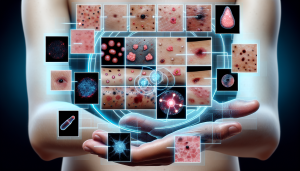 UseCasesFor.ai
UseCasesFor.ai
Choose Topic
 UseCasesFor.ai
UseCasesFor.ai
AI Use Cases
A collection of over 250 uses for artificial intelligence
A continually updated list exploring how different types of AI are used across various industries and AI disciplines,including generative AI use cases, banking AI use cases, AI use cases in healthcare, AI use cases in government, AI use cases in insurance, and more

Sign up
to receive a PDF containing all the use cases and stay updated with the latest AI trends and news (you can always unsubscribe)
Skin cancer classification

Introduction
Skin cancer is one of the most frequent types of cancer in the world and is usually diagnosed based on the visual inspection which includes screening, dermatoscopic examination, biopsy and histopathology. This disease can be effectively managed if detected early and that is why this process is quite lengthy and complicated. The use of artificial intelligence especially the computer vision (CV AI) has emerged as a game changer in this regard to provide efficient solutions for skin cancer classification. CV AI incorporates deep learning models that are capable of analyzing digital pictures and emulating the human visual perception to perform automated detection and classification of skin cancer.
Challenges
There are however some barriers that stifle the adoption of CV AI in the healthcare sector. The first one is the issue of data; this is because to train the AI there is a need for large quantities of high quality data that has been appropriately labeled, and this can be hard to come by especially due to issues of data privacy and the fact that some forms of skin cancer are rather rare. The second challenge is lack of transparency of the AI decisions which is also termed as the black box issue, this makes the clinicians to have difficulties in trusting the AI’s diagnosis. Also, implementation of the AI technology into the current healthcare facilities may be a challenge since there are different laws and guidelines to follow in different parts of the world. Lastly, despite the effectiveness of CV AI in identifying skin cancer through images, it is still inadequate for difficult cases that require the input of a human.
AI Solutions
There are however some challenges that have been seen with the use of deep learning in skin cancer classification. For example, Google’s DeepMind Health has embraced the use of AI to assess the images of medical records of NHS patients for the purpose of training the algorithms. Other companies such as IBM Watson Health are also in the process of developing skin cancer detection application powered by artificial intelligence. However, a team of Stanford researchers have created an algorithm that can actually identify cancer by simply looking at an image which is as good as a dermatologist. Some of the other AI solutions are SkinVision an application which uses image recognition to assess skin lesions from the photos taken using a smartphone and Miiskin an application that helps the users to monitor the changes which occur on the skin and moles over time.
Benefits
There are a vast number of advantages of employing CV AI in skin cancer classification. First, it may enhance the diagnostic capabilities and the time efficiency of skin cancer diagnosis thus decreasing the rate of unnecessary biopsies. Second, it will also help in the equal distribution of skin cancer screening to patients in areas where there are no dermatologists to attend to them. Third, the use of artificial intelligence can also help to ease the pressure on the overwhelmed healthcare workers, so that they can concentrate on the difficult cases and the patients. Last but not the least, since the AI is capable of learning from every interaction it has with a patient, the outcomes are only going to get better.
Return on Investment
It can be noted that the initial investment in the creation of CV AI systems can be quite substantial, however, the rewards can be equally as great. This is because through minimizing the need for unnecessary biopsies and the time taken to assess each patient, the healthcare providers can be able to cut on costs. Furthermore, these systems are beneficial as they may contribute to the improvement of the patient’s care through the identification of skin cancer at its early stages thus lowering the costs of treatment in the future. In addition, AI systems can also assist in generating important information that can be useful in analysis and formation of better medical interventions.